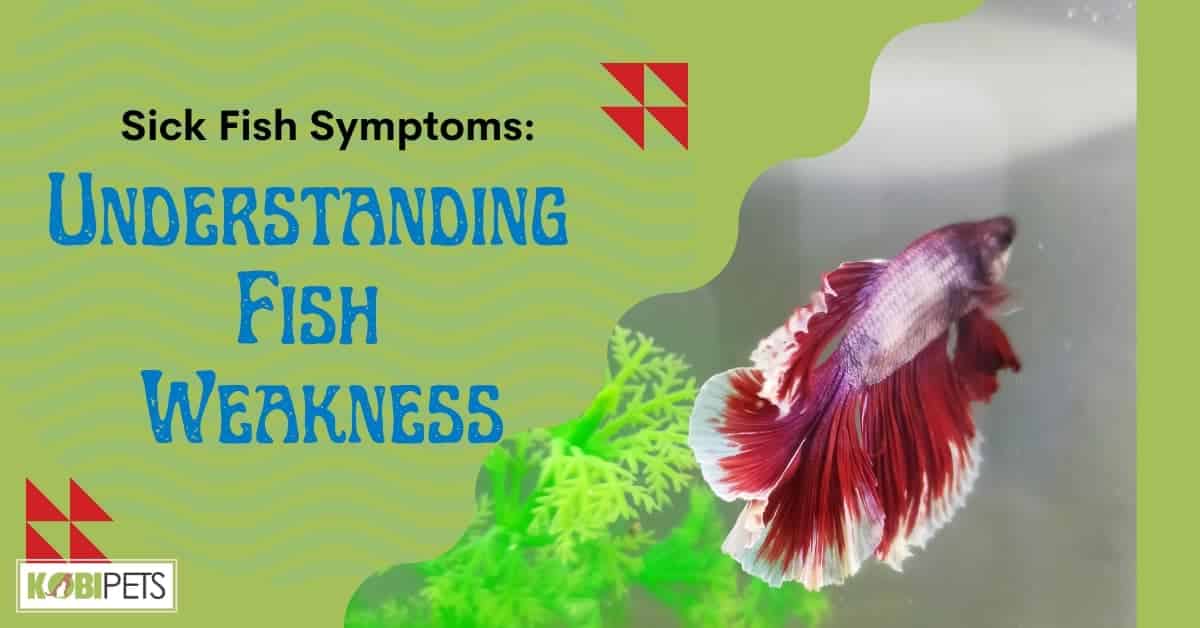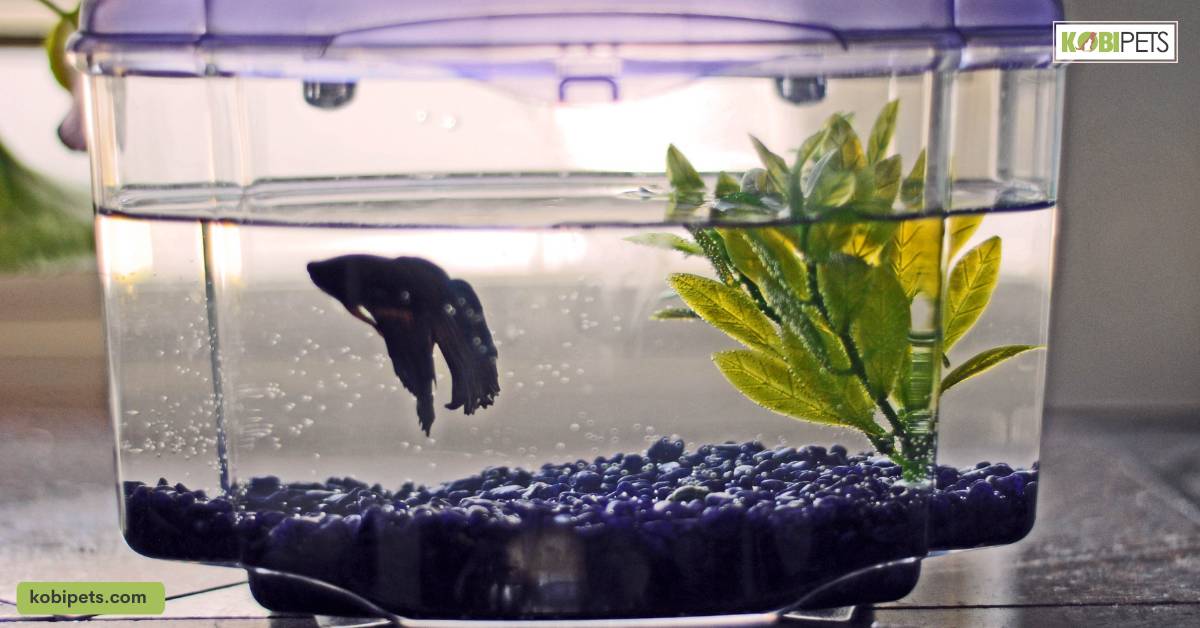
From red-streaked fins and frayed tails to cloudy eyes and bulging scales, illness in fish can present itself in a variety of ways – but many don’t know when or why it is happening.
Sick fish may display a range of symptoms that indicate their weakened state, including lethargy, loss of appetite, abnormal swimming behavior, and physical abnormalities like lesions or discoloration. Understanding these symptoms is important for identifying and addressing potential health issues in your fish, and taking prompt action can help prevent further deterioration of their health.
Physical Symptoms of Sick Fish
When it comes to understanding fish weakness, physical symptoms are key indicators of a sick fish. Common signs of a sick fish include fuzzy spots on the skin, discoloration, dull coat, redness, changes in behavior such as erratic swimming or isolating themselves from others, swelling and redness in the gill tissue, and deformed gills.
If you notice any of these symptoms in your fish, it’s important to quarantine them immediately and add antibiotics to the water.
Additionally, if your fish are experiencing stress or injuries they may become more vulnerable to disease and require special care.
It is also important to assess swimming activity when looking for signs of distress in your fish.
If you notice any abnormal feeding patterns or that they are not swimming properly then this could be an indication that something is wrong. In cases like this, it is best to consult a veterinarian for further advice on how to treat sick fish.
If you suspect that your fish has been infected with a bacterial infection such as Flavobacterium then it is important to use Maracyn first for treatment as this is one of the most common infections among aquariums.
It may also be beneficial to space out treatments if you have very weak fish so as not to put too much strain on their bodies at once.

Behavioral Symptoms of Sick Fish
Sick fish can exhibit a range of physical symptoms that may indicate illness or disease. Identifying these signs and taking action to treat the sick fish is important for maintaining its health and preventing the further spread of the illness or disease.
- Lethargic behavior, such as swimming slowly or staying still for long periods of time.
- Loss of appetite and decrease in activity level.
- Erratic swimming behavior, such as darting around the tank or bumping into rocks or other objects.
- Discoloration, including pale patches on the body, fading colors, and darkening near the head or tail.
- Unusual growths on the body, including white spots or patches, cloudy eyes, and frayed fins.
- Cloudy gills or clamped fins that appear darker than normal.
- Excess mucus or slime coating the fish’s body.
- Visible parasites on the skin or gills.
- Abnormal swimming, such as floating at the surface of the water or near the bottom of the tank.
- Reddened fins or scales that may indicate infection.

Causes of Fish Weakness
There are several potential causes of fish weakness, which can manifest in a variety of physical and behavioral symptoms. Understanding the underlying causes of fish weakness is crucial in determining the appropriate treatment and preventing future instances of sick fish.
One common cause of fish weakness is poor water quality. Fish are highly sensitive to changes in water chemistry, and poor quality water can cause stress and weaken their immune systems.
Poor water quality can result from a variety of factors, including overfeeding, overstocking, inadequate filtration, and insufficient water changes.
Another cause of fish weakness is disease or infection. There are a variety of fish diseases that can cause weakness and other physical symptoms, such as fin rot or swim bladder disease.
Parasites and bacterial infections can also weaken fish and make them more susceptible to other illnesses.
Stress is another factor that can weaken fish. Stress can be caused by a variety of factors, including overcrowding, poor water quality, aggressive tank mates, and changes in the environment. Chronic stress can weaken fish and make them more susceptible to illness and disease.
Finally, genetics can also play a role in fish weakness. Some species of fish are more prone to certain diseases or physical weaknesses than others, and certain genetic mutations can make fish more susceptible to illness and weakness.

Treatment for Sick Fish
Treating sick fish can be a difficult task, but it is important to take the necessary steps to ensure your fish are healthy and happy. The first step in treating sick fish is to identify what type of illness they have.
Common illnesses include bacterial infections, ich and external parasites, fungal infections, and other diseases.
Once you have identified the illness, you can begin treatment. For bacterial infections, Maracyn is a good option as it will help fight off the infection for a week at the recommended dosage. Ich and external parasites can be treated with aquarium salt or ammonia remover products.
Fungal infections can be treated by cleaning the tank fully and using potassium permanganate in the water for two or three days. Other diseases may require different treatments depending on their severity.
It is also important to maintain good water quality when treating sick fish. Test water quality frequently changes the water regularly, and keep an eye out for any signs of stress or disease in your fish such as lethargy or changes in coloration.
Additionally, Seachem Metroplex and Seachem Focus are two products that work together to combat a variety of infections and parasites; adding the proper amount of powdered medication to your tank will help treat your sick fish quickly and effectively.

Prevention of Sick Fish
Prevention is always better than cure, and this holds true for fish health as well. Here are some steps you can take to prevent your fish from getting sick:
- Maintain water quality: The most important factor in keeping your fish healthy is to maintain good water quality. Regularly test the water for pH, ammonia, nitrite, and nitrate levels and ensure they are within safe limits. Perform regular water changes to remove accumulated toxins and debris.
- Quarantine new fish: When introducing new fish to your aquarium, quarantine them for at least a few weeks before adding them to the main tank. This will help prevent the spread of diseases.
- Avoid overfeeding: Overfeeding is a common cause of poor water quality and can lead to a range of health issues in fish. Feed your fish only what they can consume within a few minutes and avoid leaving uneaten food in the tank.
- Provide a balanced diet: A well-balanced diet that meets the nutritional needs of your fish is essential for their health. Research the specific dietary needs of your fish species and provide a variety of foods, including pellets, flakes, and live or frozen foods.
- Maintain a stable environment: Sudden changes in water temperature, pH, or other parameters can stress fish and make them more susceptible to illness. Keep the tank environment stable and avoid making drastic changes.
- Practice good hygiene: Proper tank maintenance, including regular cleaning of the tank, filters, and other equipment, can help prevent the buildup of harmful bacteria and other pathogens.
- Choose healthy fish: When selecting new fish for your tank, choose healthy specimens from a reputable source. Look for fish that are active, alert, and have no visible signs of illness or injury.

In conclusion
In conclusion, it is important to understand the various signs of fish weakness. Despite their aquatic habitat and streamlined bodies, fish can still become sick and experience symptoms like the ones listed above.
By providing proper care such as maintaining a healthy environment, watching your fish’s behavior, and examining them regularly, you can help to keep them healthy and well. It’s also useful to be familiar with the common symptoms so that you can act quickly if any arise.


